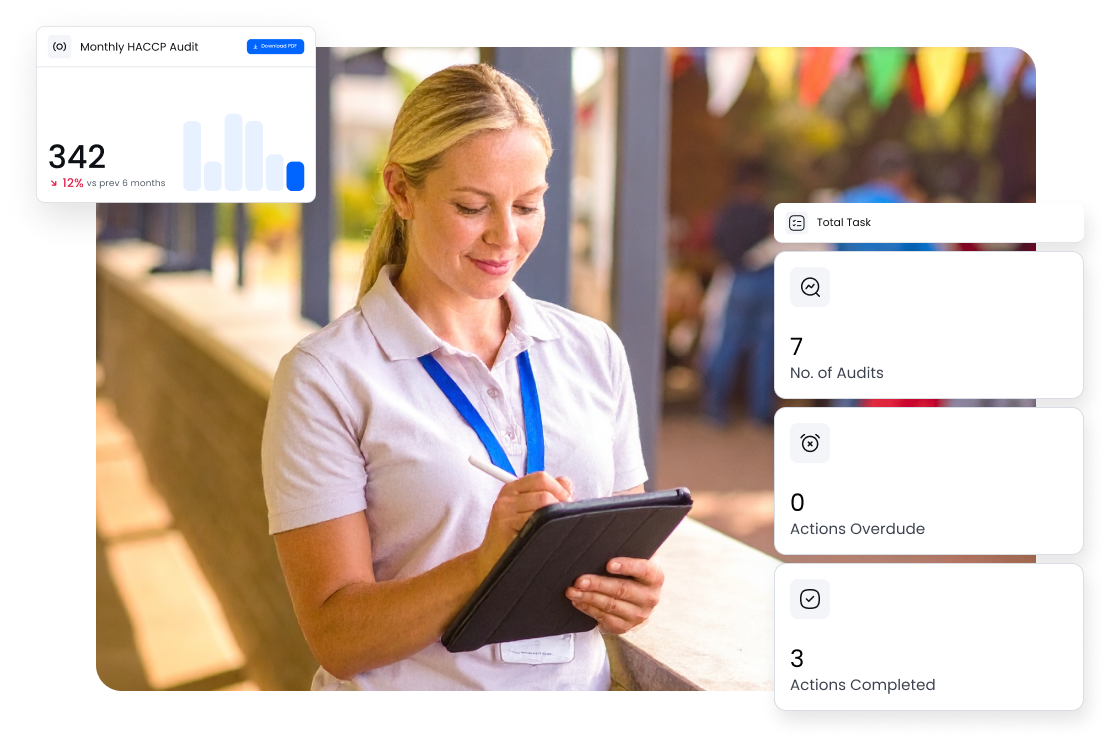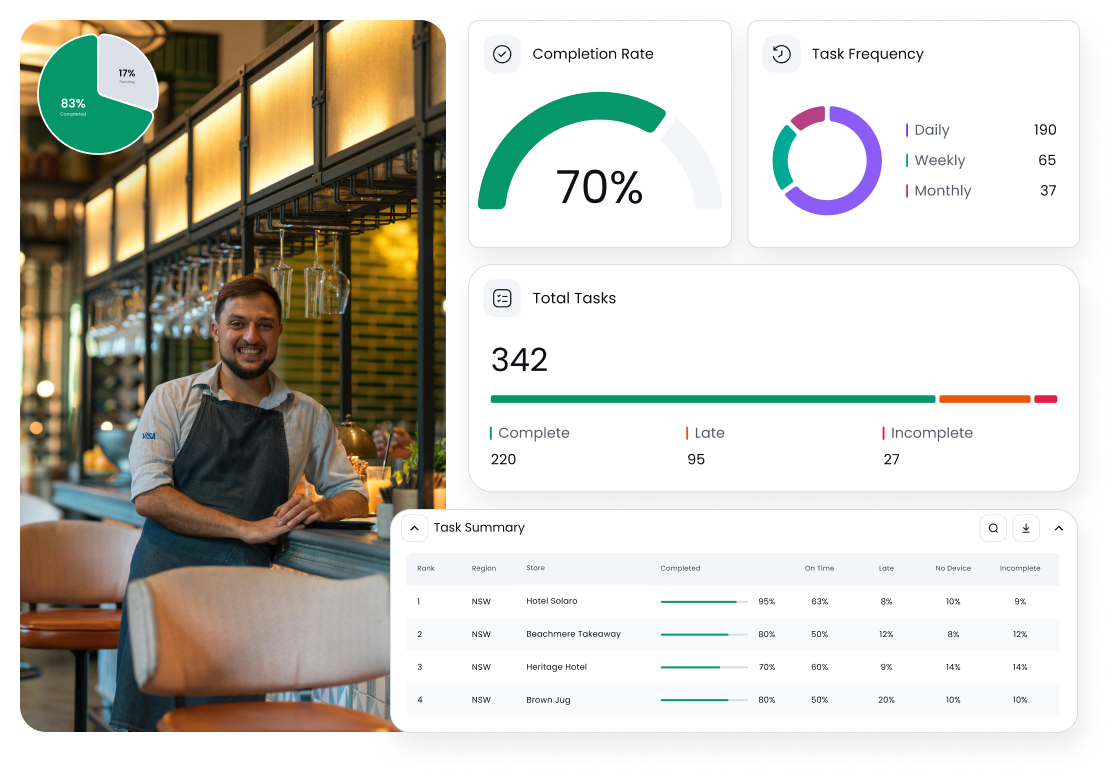Streamline food safety auditing
Consolidate your audit workflows in one place. Equip teams with tools to run internal checks, drive accountability, and stay compliant. Without the paperwork.
Pass audits with confidence, with Squizify
Squizify makes audit readiness part of your everyday operations. With centralised tools to manage in-house audits and council inspections, you're always ready to impress.

Consolidate your audit workflows in one place. Equip teams with tools to run internal checks, drive accountability, and stay compliant. Without the paperwork.

Tailor audits to match how your operations run. Replicate council formats or simulate surprise inspections to ensure locations are always prepared.

Enable field reps to capture site performance quickly and consistently. Squizify empowers regional teams with real-time dashboards and mobile-ready audit flows.

With real-time alerts and traceable actions, no issue slips through the cracks. Squizify helps teams respond faster and fix problems before they escalate.

By prioritising food safety, businesses can build customer trust and uphold their reputation in the competitive food industry.
Food safety involves preventing food supply contamination by identifying and controlling hazards in the food supply chain. This includes implementing good hygiene practices, proper cleaning and sanitising of food premises and equipment, ensuring that food handlers are trained and aware of food safety issues, and continuously monitoring food temperatures. A food safety supervisor oversees the food safety program, ensuring all employees are trained and compliant with food safety regulations. By maintaining high standards of cleanliness and hygiene and by continuously monitoring and improving food safety practices, businesses can effectively manage risks and protect public health.
Compliance with food safety regulations is crucial for food businesses to prevent severe consequences, such as hefty fines and irreparable damage to their reputation. Food safety regulations are developed by governing bodies to ensure food products are safe for consumption and prevent foodborne illnesses. By complying with these regulations, food businesses can ensure that their products are safe and high-quality, essential for maintaining customer trust and loyalty. Adhering to food safety standards protects consumers and enhances the overall quality and reliability of the food supply chain, fostering a culture of safety and excellence within the industry.
Food safety regulations ensure that food businesses operate safely and hygienically. These regulations vary by country and region, but they all share the common goal of preventing foodborne illnesses and promoting food safety compliance. Understanding and adhering to these regulations is essential for any food business aiming to provide safe and high-quality products. Compliance with food safety regulations helps businesses avoid legal issues, protect their brand reputation, and ensure the health and safety of their customers.
Navigating the regulatory landscape can be challenging for food businesses, especially those that operate in multiple countries or regions. Understanding the different food safety regulations and standards that apply to your business, such as the international HACCP principles and food safety standards, is essential. By developing a comprehensive food safety program and ensuring compliance with regulatory requirements, food businesses can minimise the risk of foodborne illnesses and provide a safe and healthy food supply. This includes establishing record-keeping, temperature monitoring procedures, and corrective actions to prevent food supply contamination and ensure compliance with food safety regulations. Staying up to date with regulatory changes and continuously improving food safety practices are key to maintaining compliance and protecting public health.
Food businesses face increasing pressure to maintain rigorous safety standards while operating efficiently. Whether you’re running a small café or a large-scale food processing operation, Squizify enables teams to centralise all auditing activities through an easy-to-use food safety software platform. The platform is accessible online or through a food safety app, allowing users to track issues in real time and access a unified dashboard for complete oversight. With built-in tools for customising inspections and replicating council audits, food businesses can stay ahead of regulatory requirements and protect their brand.
The food industry is shifting rapidly toward digital transformation, and manual paper-based compliance processes can’t keep up. Food safety compliance is no longer a checkbox— government agencies are increasing expectations around transparency and traceability.
Squizify’s cloud-based auditing and monitoring tools help businesses overcome this challenge by providing real-time data visibility, automated audit trails, and streamlined inspections that reduce administrative burden while improving safety outcomes.
Well-trained staff are essential for maintaining high compliance standards. Squizify supports food handler training by offering an intuitive interface for audits, clearly defined responsibilities, and a structured audit history to reinforce consistent, compliant behaviour. With everything documented in one place, your team is better prepared for inspections and corrective actions. A key focus is on proactive training that empowers staff to take ownership of food safety before risks arise.
Food safety plans must be adaptable, scalable, and enforceable. Squizify allows businesses to tailor inspections to store-specific workflows, simulate real audit scenarios, and update safety plans based on operational insights. This tailored approach ensures food safety plans are living documents, not static checklists. It enables businesses to adapt to changes in their production process and respond quickly to emerging risks.
Managing food safety across multiple locations is complex. Squizify solves this by enabling standardised processes across sites, real-time issue tracking, and centralised reporting. Store managers and head office teams can monitor compliance levels and take action quickly to ensure all locations meet the same high standards. This is especially important as businesses must act decisively when issues are identified to avoid legal and operational setbacks.
Critical control points (CCPs), such as storage temperatures or cleaning schedules, must be consistently monitored. Squizify’s real-time monitoring tools, like wireless temperature tracking, automatically log readings and trigger alerts when limits are breached. This supports preventive controls that reduce the likelihood of contamination and keep operations running smoothly.
Squizify supports businesses through every stage of hazard analysis and critical control (HACCP). Its custom audit builder allows you to structure workflows around identified hazards and control measures, while the audit history and dashboard offer full traceability for every inspection and response. By digitising this process, Squizify ensures verification procedures are consistently followed and documented, creating a robust compliance ecosystem.
Reliable record keeping is non-negotiable in food safety compliance. With Squizify, all inspection results, issue resolutions, and temperature logs are captured digitally, eliminating the risks of lost paperwork or inconsistent records. Everything is stored securely and is instantly accessible when needed—ideal for internal reviews or regulatory inspections. This level of transparency also helps businesses demonstrate adherence to the law during audits or investigations.
When issues are flagged, businesses need to act fast. Squizify’s action tracking system enables food businesses to assign, document, and follow up on corrective actions in real time. This ensures swift resolution, clear accountability, and full traceability—minimising disruption and maintaining compliance. For example, if a temperature breach is detected, staff are immediately alerted and corrective action is logged, ensuring nothing is missed and compliance remains intact.
